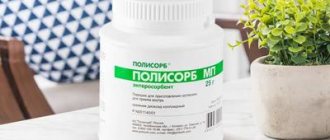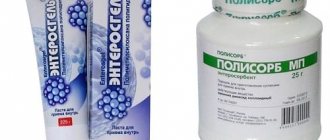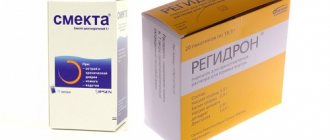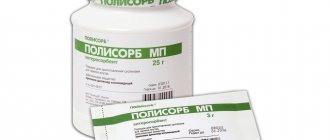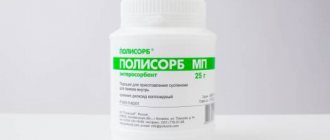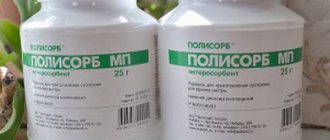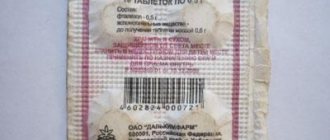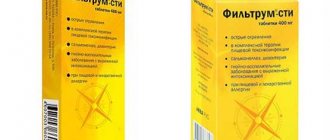Alternative use of the drug
The powder is used externally for purulent skin diseases.
Treat trophic ulcers, treat burns. It is also effective in stopping external bleeding from small wounds on the skin.
Polysorb is used to cleanse the body of harmful substances. The prophylactic course ranges from 7 to 14 days. But breastfeeding women should postpone such prophylaxis until the end of the guard.
It is convenient to keep it in your first aid kit and take it with you when traveling.
Can the product be used by a nursing woman?
"Polysorb" alleviates the condition during pregnancy, eliminating nausea and vomiting. For hepatitis B, the drug is prescribed for the treatment of intoxication of various natures, for acute poisoning and allergies.
The sorbent removes toxins and antigens, absorbs harmful microorganisms, but does not destroy beneficial microflora and does not enter the blood.
What is Polysorb MP?
Today, Polysorb, a product for removing toxins, cleansing the body and even losing weight, is at the top of the ratings, having long ago successfully pushed aside the banal activated carbon.
The reasons for this popularity lie in its undoubted effectiveness. Clinical studies have proven that the new generation enterosorbent is more effective than aluminosilicates, methyl silicic acids and other means for disinfection and detoxification. All previously used sorbents are three or more times inferior to it in terms of effectiveness.
Unfavorable environment, poor-quality food products, taking medications for the treatment of common pathologies, unhealthy lifestyle and lack of physical activity - all these are factors that have a negative impact on the condition of internal organs, weakening natural immunity.
A young mother who begins breastfeeding also has a weakened immune system, which naturally leads to the appearance of diseases caused by viral infections or a condition that she has successfully overcome.
Polysorb MP, which does not contain any additives, is a sorbent consisting of colloidal silicon dioxide, produced in disposable bags, bottles with powder and plastic jars with varying amounts of the main active ingredient.
In some countries, it is recommended as a means of cleansing the intestines for preventive purposes even before the diagnosis is made. It is believed that the sorbent not only exceeds long-used drugs in terms of sorption capacity (the ability to remove more toxins and wastes), but also suggests a greater breadth of application.
Indications
The drug neutralizes toxic substances, showing activity against toxins of food, bacterial, endogenous and exogenous nature. That is, this sorbent relieves intoxication of various origins.
Breastfeeding mothers can take Polysorb to eliminate pathological conditions such as:
- Acute poisoning.
- Diseases of the gastrointestinal tract that are infectious in nature.
- Disorders of the digestive system caused by food incompatibility.
- Disruption of beneficial intestinal microflora, which develops as a result of long-term use of antibacterial drugs.
- Intoxication, provoked by the presence of an inflammatory process in the body, accompanied by the formation of foci of pus.
- Poisoning with drugs, toxic substances, consumption of low-quality alcohol.
- Hepatitis, causing increased bilirubin and intoxication.
- Allergic manifestations.
For preventive purposes, it is recommended to take the sorbent when working with harmful substances.
The use of the drug is also prescribed for toxicosis caused by pregnancy.
Resulting effects
Polysorb passes only through the digestive and hepatobiliary systems; during its transportation, it captures toxic components in the intestines and, together with them, is evacuated by the excretory system without any special consequences. Cleansing the body with colloidal silicon oxide allows you to successfully remove from it:
- products of the presence and vital activity of infections and viruses;
- biological waste that the body cannot break down and absorb in diseases of the gastrointestinal tract and GBS, leading to the development of flatulence and other dyspeptic manifestations;
- food components with a poisonous effect (infected or expired);
- ethanol compounds for alcohol intoxication;
- toxins produced by parasitic infestations.
Passing through the intestines, Polysorb performs several important missions at once - it removes toxic compounds, prevents the development of functional failures and optimizes the general condition. Prophylactic administration also has undoubted advantages - it prevents toxins from accumulating in the body, removes the products of fermentation and putrefactive processes, and improves digestion. The effect of this allows a healthy person to reduce their weight.
The scope of its action involves eliminating the negative consequences of purulent-septic diseases, dysbacteriosis and variable intestinal infections. When carrying a child, the drug is one of the permitted ones. The dosage during pregnancy is reduced and recommended at the child level.
pharmachologic effect
The emulsion obtained by mixing Polysorb with liquid cleanses the intestines of allergens, microbes, chemicals, and poisons. The product absorbs and removes excess bilirubin, urea, and lipids, which have a negative effect on metabolism.
The sorbent destroys fungi and bacteria, promotes exit from the body;
- metabolites;
- alcohol;
- metal salts;
- radionuclides;
- antigens.
The active component of the drug stimulates the restoration of microflora and destroys non-viable cells. The medicine acts very quickly, but does not irritate the gastric mucosa and does not enter the bloodstream.
Mode of application
During lactation, Polysorb is used in the form of a suspension. The use of the drug in its dry form is not allowed.
The powder is added to 100 ml of warm water. In this case, it is necessary to take into account the patient's weight. However, an overdose does not have a negative effect on the body, so a slight deviation from the specified norm is allowed.
The task of a nursing mother is to take care not only of her health, but also of how the effect of the drug will affect the quality of milk.
Main characteristics of Polysorb
The drug is highly effective in combating intoxication. A nursing mother can feel an improvement in her well-being within just a few minutes.
Efficiency
The medicine begins to exert its cleansing effect in a very short time, after 2–4 minutes. Unlike activated carbon tablets, Polysorb does not need time to dissolve. Once in the stomach, this medication immediately begins the absorption process. The volume of sorption capacity of Polysorb is 300 mg/g, which is the highest among enterosorbents. Thanks to this property, Polysorb most tightly envelops the walls of the gastrointestinal tract, which increases the rate of removal of harmful toxins from the body. So, one tablespoon of this medicine replaces 120 tablets of activated carbon, and drinking the drug diluted in water is much more pleasant than trying to swallow pills.
Time to fight the disease
The expected effect and duration of the fight against the disease depends on the reason for which Polysorb was prescribed.
Thus, for acute intestinal infections, the course of treatment will be 5–7 days, but if necessary, therapy can be extended to 10–15 days. For food poisoning, 3–5 days of taking the drug is sufficient. The course of treatment for viral hepatitis takes 7–10 days, provided that complex therapy is carried out. Chronic food allergies, hay fever, urticaria, toxicosis of pregnant women require treatment for 10–14 days. And in case of chronic renal failure, Polysorb should be taken over a longer course - from 25 to 30 days.
Contraindications
Polysorb has few contraindications. You should not take this medicine in case of exacerbation of stomach and duodenal ulcers, bleeding from the gastrointestinal tract, decreased intestinal tone and motility, as well as individual intolerance to the drug.
Side effects
Side effects of this medication are quite rare, but a nursing mother needs to be aware of the possibility of their occurrence. Thus, undesirable effects can manifest themselves in the form of allergic reactions to the drug, constipation, and dyspepsia. It should also be noted that when using Polysorb for longer than 14 days, difficulties may arise with the absorption of vitamins and calcium. To prevent this phenomenon, you should take calcium-containing and multivitamin preparations.
About the drug
The enteric drug Polysorb is prescribed for the treatment of intoxicated conditions of the body. The main substance included in the composition absorbs toxins of a wide variety of types. The medicine is aimed at cleansing the gastrointestinal tract of chemical toxic substances acting both externally and internally, and individual metabolic products. The task of the medication is to bind and remove toxic substances from the intestines. The effect of the drug begins within a few minutes.
Available in the form of a dry mixture. A suspension is prepared from the contents of a bag or jar. The blue-white powder is characterized by the absence of odor. When combined with water, a suspension appears. The active ingredient is pyrogenic silicon dioxide. There are no other additional components here. Polysorb is packaged in sachets of 3 g and plastic jars of 12, 25 and 50 g.
Treatment with Polysorb is carried out thanks to the following functions:
- binding and absorption of toxic substances of a wide variety of origins;
- destruction of non-vital cells;
- stimulation of recovery;
- removing toxins from the body.
In what cases is it prescribed?
"Polysorb" is used for intestinal infections of bacterial origin, and for food and medicine poisoning. The drug is indicated for the treatment of:
- diarrhea;
- toxicosis;
- salmonellosis;
- bacteriosis
The sorbent is used during the flu and cold season, since silicon dioxide prevents viruses from entering the body. The drug, which cleanses the intestines of toxins, is used for allergies of various natures. "Polysorb" is prescribed for cholera, jaundice resulting from hepatitis, chemical poisoning at work, in the complex treatment of renal failure, purulent-septic pathologies.
Why do doctors recommend Polysorb to a nursing mother?
What guides the doctor when choosing a medicine to help a nursing mother? That's right, his safety.
The safety and simplicity of its inorganic composition - aerosil or silicon dioxide - is a translucent or bluish powder, light and friable without aroma or taste, do not detract from its sorption intoxication effect:
- Without being broken down in the body, the drug passes through the gastrointestinal tract, capturing substances that the body does not need along the way:
- poisons of biological origin - toxins;
- radionuclides - sources of internal radiation (uranium isotopes) accumulated in the body with food, water, and air inhalation;
The unit of measurement for the process of removing radionuclides from the body is the half-life, characterized by the release of half of the radioactive substance entering the human body
- antithetes that cause allergic reactions: household - dust particles, chalk, inhaled vapors of spent automobile fuel;
- epidermal - particles of the skin - fur, fluff and secretions - saliva, excrement of domestic animals;
- insect - furniture bugs, cockroaches, house ants, mosquitoes and flies;
- pollen - an accumulation of pollen grains of flowering plants, for example, poplar fluff;
- food - abuse of poorly tolerated foods: all types of citrus fruits;
- chocolate;
- red berries;
- nuts;
- seafood;
- cow's milk;
- River fish.
- medicinal - adverse reactions to medications taken, even when taking antihistamines. For example, skin rashes during cetirizine therapy;
- fungal - mold and yeast on walls, in bathrooms, old floor coverings;
- helminths - products of the activity of pinworms, roundworms that have settled in the intestines or any other internal organ, which the body considers as destruction and responds to their growth with its immune response - antibodies.
- tiny intracellular parasites that enter the body during acute respiratory viral diseases;
- pathogenic bacteria that can contaminate kitchen sinks, cutting boards, dishes in dining rooms, soft toys and furniture in the house, keyboards in the workplace, and even shower screens in the pool;
- breakdown products of endogenous substances - elements involved in metabolism:
- uric acid, which, when accumulated, destroys joints;
- bilirubin, intensely secreted during poisoning, bile stagnation, blood diseases, anemia;
- lipoproteins: harmful cholesterol that can clog blood vessels;
- Low-density lipoproteins are provocateurs of arterial disease (atherosclerosis).
- Gently cleansing the body without damaging the gastric mucosa, it normalizes metabolism and the functioning of internal organs, such as the liver and kidneys.
- Literally within the first five minutes, it noticeably reduces the acute symptoms of various poisonings - constant nausea, redness of the mucous membranes and skin from frequent spasmodic bowel cleansing with simultaneous diarrhea, dizziness, followed by cold sweat with feverish chills, increased flatulence, cramps and joint pain. Will alleviate conditions caused by:
- food poisoning from stale food;
- inhalation of heavy metal vapors penetrating through mucous membranes: mercury when a thermometer is broken;
- copper;
- lead;
- thallium
- drug overdoses;
- intestinal infections (bacterial and viral nature).
- Used in complex therapy:
- dysbacteriosis;
- viral hepatitis B - an infectious disease of the liver, expressed by flu-like symptoms, skin rashes, disturbances of consciousness and bleeding of the nose and gums (hemorrhagic syndrome) and jaundice with characteristic staining of the skin and mucous membranes due to increased hemoglobin;
- chronic renal failure - irreversible failure of the kidneys to fulfill their functional duties due to the death of parts of the kidneys (nephrons).
- Has a pronounced cosmetic effect:
- cleanses the skin of rashes and inflammations (pimples, acne), cleansing the intestines from the inside and as a mask from the outside;
- eliminates dental plaque.
- In combination with a well-chosen diet for nursing mothers, it reduces excess weight after childbirth and eliminates constipation.
- Numerous reviews on the Internet confirm its effectiveness in combating hangovers. But in this article for nursing mothers, for obvious reasons, we do not disclose this information in detail.
Features of use during breastfeeding
The dosage of Polysorb should be calculated based on the patient’s weight.
As we have already found out, a nursing mother can use this drug without fear, it is only necessary to take into account some of the features of administration. The medication should not be used in dry form. Polysorb powder must always be diluted with non-carbonated clean water in accordance with the table and mixed thoroughly. Thus, we will receive one dose of medicine, which must be taken 3-4 times during the day.
| Patient weight | Dosage of the drug | Water volume |
| up to 10 kg | 0.5–1.5 teaspoons per day | 30–50 ml |
| 11–20 kg | 1 level teaspoon per serving | 30–50 ml |
| 21–30 kg | 1 heaped teaspoon per serving | 50–70 ml |
| 31–40 kg | 2 heaped teaspoons per serving | 70–100 ml |
| 41–60 kg | 1 heaped tablespoon for 1 serving | 100 ml |
| over 60 kg | 1–2 heaped tablespoons per serving | 100–150 ml |
A teaspoon of Polysorb contains about 1 gram of medicine, and a tablespoon - 3 grams.
A nursing mother should remember that the maximum daily dose of the drug for adults is 12–24 grams, the maximum single dose at the first dose should not exceed half the daily dose, then it should be taken according to weight. Silicon dioxide cannot cause overdose, so measurement errors should not be a concern.
The time at which it is necessary to take the drug also depends on the type of disease. In case of food allergy, Polysorb should be consumed during meals or immediately after. For chronic allergies, poisoning, viral hepatitis, chronic renal failure, toxicosis in pregnant women, as well as when it is necessary to cleanse the body, drink Polysorb 1 hour before meals or at least an hour after. In case of poisoning, it is also recommended to rinse the stomach with a solution of this sorbent - from 2 to 4 tablespoons per 1 liter of clean still water. For acute intestinal diseases, the medicine is taken every hour on the first day, and then 4 times a day according to the dose.
It is advisable to dilute the drug before each dose, however, the prepared suspension can be stored for 24 hours at a temperature of 8–15 ° C, which simplifies the preparation of the daily dose of the drug.
How does it affect lactation?
The sorbent removes toxins and antigens, absorbs harmful microorganisms, but does not destroy beneficial microflora and does not enter the blood.
Taking the drug does not affect the production of the hormone responsible for lactation.
Impact on a child during breastfeeding
During breastfeeding, much of what enters the mother's body passes into breast milk. Therefore, the mother should approach diet and medication thoughtfully. But this applies to everything that can be digested by the digestive system and enters the bloodstream.
Let us repeat once again: polysorb during breastfeeding is indicated as a means of cleansing the mother’s body. It is harmless to mother and child because it does not break down into its components. Accordingly, it does not penetrate into the blood and further into breast milk.
Polysorb will quickly help a nursing mother relieve intoxication, speed up the recovery process and, most importantly, preserve the process of breastfeeding and significantly reduce the period during which harmful agents penetrate into milk.
Contraindications and possible side effects
In many publications and in the instructions for use, Polysorb for hepatitis B is called the optimal remedy that has no obstacles to its use
But feeding a child is a process that requires extreme caution when using drugs, even those that are considered absolutely neutral and do not pose any threat due to their non-exposure to breast milk.
Lactation involves a responsible approach to the choice of foods, excluding those that can cause undesirable effects in the baby’s imperfect digestive system or worsen the mother’s well-being
Therefore, any medications should be treated with caution:
- Taking Polysorb while breastfeeding can cause allergies in the mother if she has an individual immunity to the main active ingredient of the drug, the development of an allergic reaction. Considering that the baby’s well-being depends entirely on how the nurse feels, and his immunity is formed through mother’s milk, he could potentially also feel unwell if she has allergies.
- Like any sorbent, evacuating harmful compounds from the body, Polysorb during breastfeeding can capture useful substances - vitamins, micro- and macroelements. If for any reason a young mother takes medications approved for lactation (for example, natural remedies for intestinal dysbiosis or herbal hepatoprotectors), their absorption will also be reduced. Most of the medicinal compounds will be excreted through the excretory system along with others, whose removal is the real purpose of taking the new generation enterosorbent.
- When breastfeeding, the child dosage is observed, as during pregnancy, but even a small amount of powder in the form of a suspension can cause, according to the compilers of the instructions for use, belching, a feeling of fullness in the stomach and associated intestines, and a sour-metallic taste in the mouth. Such unpleasant sensations lead to a deterioration in appetite, but it is well known that a woman, before feeding, must eat well herself so that the milk arrives and the quantity is enough for the baby.
- Even less desirable is the development of constipation, which is also included in the list of potential negative consequences. When feces accumulate in the intestines, digestion and full absorption of the compounds necessary for the child deteriorate. The accumulation of decay products causes intoxication and worsens well-being. If constipation is not eliminated using traditional methods and is not corrected with food, the need for laxatives arises. Some of them pass into breast milk.
- There are conditions in which Polysorb is strictly contraindicated, and this also needs to be taken into account. It should not be taken for ulcerative lesions of the gastric and duodenal mucosa and impaired bowel function (atony, pathological motility, weakness of smooth muscles).
Particular attention should be paid to prohibiting the use of Polysorb during hepatitis B if bleeding of any etiology is observed in the body. This is an indispensable attribute of the postpartum state, when the body is recovering from gestation, and this period can normally vary in duration, remaining within the conventional norm
Taking a sorbent will not only be undesirable, but can also lead to dangerous consequences. Therefore, you should not take on faith recommendations for taking Polysorb daily, even in small quantities, for prevention or cleansing the body.
Is it possible to take Polysorb while breastfeeding?
According to the instructions, the drug is not prohibited for use by pregnant women and during lactation. Every mother is puzzled by the question of the safety of the drug. They resort to using medication for treatment and prevention purposes. The following must be taken into account:
- the sorbent is drunk only when signs of poisoning appear to quickly remove toxins and prevent the development of complications;
- the dosage is selected taking into account the type of intoxication;
- The optimal course of treatment should not exceed 2 weeks.
Polysorb can be used during breastfeeding. The main thing is to take into account the peculiarities of using the sorbent.
The drug acts only in the intestines and is not absorbed into the bloodstream. For this reason, it does not pass into mother's milk and does not have a direct negative effect on the newborn baby.
Medical point of view
Polisorb recommends drinking in order to eliminate harmful toxins from the body of a nursing mother. Taking Polysorb while breastfeeding reduces the risk of negative effects on the child. It must be taken into account that the sorbent is used only according to indications. There is no need to use the drug without a reason. This can lead to increased excretion of nutrients.
Self-medication should be avoided if symptoms of an intoxication process appear. Poisoning often manifests itself as diarrhea, vomiting, abdominal pain and fever. It is recommended to contact a clinic to receive qualified assistance.
The need to use medication
Polysorb for a nursing mother is required to quickly remove toxins from the intestines. Drink an aqueous suspension when signs appear:
- acute poisoning;
- intestinal infection;
- intoxication to poisons of diverse nature;
- disturbances of the gastrointestinal microflora (dysbacteriosis);
- allergies of various origins.
You can get poisoned by consuming low-quality food products. In this case, a toxic infection forms. To quickly eliminate pathogenic microbes, it is recommended to use Polysorb.
The sorbent is usually used as part of complex therapy. Therefore, the remedy is not a panacea. If poisoning or allergies develop, you should consult a doctor.
When should you take the remedy?
Many mothers wonder whether it is possible to drink Polysorb while breastfeeding? The drug is considered a harmless detoxifying agent. This is explained by the fact that the medication is not able to be absorbed into the blood or penetrate into breast milk. Therefore, nursing mothers do not have to worry about the negative impact of Polysorb on the baby’s health. The medicine is suitable for the treatment of women during pregnancy and natural feeding of newborns.
The situations for using polysorb are quite numerous due to its harmlessness and effectiveness. If it is necessary to take enterosorben, the mother does not even have to worry about whether polysorb can be taken while breastfeeding.
With confidence in its safety for women and children, it is allowed to be taken by doctors.
It is most often used in the following cases:
- For the treatment of diarrhea of any origin. Most often these are ordinary toxic infections (household poisoning), but it is also effective for bacterial, viral and other intestinal pathologies with loose stools. Polysorb will also help in the complex treatment of intestinal and vaginal flora disorders.
- Polysorb is used in situations where, against the background of some infectious process, intoxication syndrome is pronounced (fever, weakness, lethargy, nausea, sweating, etc.). Such symptoms arise due to the active action of microbial toxins, which this drug can remove from the body. This way, the main treatment will be more effective, and the person will feel much better.
- Polysorb is also used to cleanse the body in case of acute or chronic poisoning of any etiology, ranging from medications, alcohol to salts of heavy metals and other compounds. It can be successfully used, for example, by people in polluted production or living in environmentally unfavorable areas, with a hangover, etc.
- Actively copes with allergy symptoms. While taking it, rashes and other symptoms go away much faster.
- It is also used for changes in the function of the kidneys, liver, lungs, and skin. After all, it is through them that harmful metabolic products are released, and if their work is disrupted, intoxication of the body begins. It is noteworthy that due to the fact that polysorb is not absorbed in the intestines, it does not create additional stress on these organs.
- It is used for toxicosis in pregnant women to reduce the manifestation of clinical symptoms.
Dosage and instructions for use
Before use, the drug is mixed with a quarter or half a glass of water. The amount of powder is taken depending on the person’s body weight. With a weight of 60 kg or more, 1 tbsp is enough for a nursing mother at one time. spoons of "Polysorb". For food allergies, the drug is taken three times a day with meals, for the treatment of urticaria - before or after breakfast, dinner, lunch. The course of therapy lasts 2 weeks.
In case of poisoning, the stomach is washed with a solution that is prepared by mixing 4 tablespoons of sorbent with a liter of water, and the suspension is consumed for 5–7 days. For bacterial infections, the drug is combined with other medications, taken every 60 minutes on the first day, and four times the next day.
To cleanse the body of waste and toxins, “Polysorb” is used for 2 weeks. Taking the sorbent for renal failure is prescribed for up to a month.
Information you need to know before using the drug
Before using Polysorb while breastfeeding, it is necessary to take into account a number of features. These include:
- the duration of use should not exceed 14 days, unless otherwise prescribed by the doctor;
- alternating Polysorb and other medications;
- use the suspension one hour before meals;
- taking into account the maximum permissible daily dose.
At home it should be used only as a first aid remedy for poisoning or intoxication.
Dosage for breastfeeding
Must be taken 3 times a day. The maximum daily amount during breastfeeding is 0.3 g/kg. On average, up to 0.12 g/kg is allowed per day. The exact dosage is determined depending on the type of pathology. With hepatitis B against the background:
Preparation of the medicine
- Poisoning of various origins: it is recommended to rinse the stomach with 1% of the prepared suspension. Apply 150 mg/kg body weight. Multiplicity 2 times a day.
- Infections in the gastrointestinal tract: on the first day the drug should be taken every 5 hours. Then in 4 doses with a 60-minute break between meals or taking other medications.
- Food or drug allergies: wash the stomach in the same way. Drink 0.6 g/kg 1 hour before meals. Duration is one week.
Polysorb is included in the complex treatment of urticaria, exacerbations of bronchial asthma, and seasonal hay fever.
The drug is also approved for use in children from the first months of life. It is used in the event of diathesis, diarrhea of unknown origin, or rotavirus infection. In this case, the powder is diluted strictly according to the instructions, taking into account body weight.
Consequences of taking: can Polysorb harm a child?
The drug does not enter the baby's diet and does not harm the baby. But when taking it, you should pay attention to the condition of the baby, skin and stool. If there is a change in behavior (crying, restlessness, refusal to eat), bowel movements, or the appearance of a skin rash, you should immediately stop taking the medication and contact your pediatrician.
The drug is considered harmless because it does not contain dyes or additional excipients. Does not affect the functioning of internal organs. Therefore, it is used in pediatrics and prescribed to children of all ages, including up to one year.
Having considered all possible indications for taking an enterosorbent such as Polysorb, as well as paying attention to the features of use, we can conclude that the drug is highly effective and safe. Ease of use is another advantage in choosing this medication. If a nursing mother gives her preference to such a medicine, then she should not worry about stopping breastfeeding for the duration of treatment; it will not harm the baby’s health. This drug will help the mother of the baby to quickly cope with the disease and return to an active and fulfilling life. Be healthy!
Alternative ways to use Polysorb
The drug Polysorb is an enterosorbent that actively removes various toxic substances, harmful microorganisms, and antigens from the body. It is often used not according to instructions.
Women use Polysorb powder for the following purposes:
- To lose weight. In this situation, the use of Polysorb is necessary only to cleanse the body of toxins. As a rule, the drug becomes the first step towards getting rid of extra pounds.
- To get rid of pimples and acne. This method of using Polysorb would be appropriate if the provoking factor for the formation of skin rashes is a dysfunction of the gastrointestinal tract. Many women not only drink Polysorb for these purposes, but also use the powder as components of cosmetic products - scrubs and masks.
Reviews of women who used the medication during breastfeeding
If you still doubt whether Polysorb can be used while breastfeeding, then read the reviews of women who have used this medication. Almost unanimously they talk about the positive results of therapy. Enterosorbent helped patients get rid of unpleasant symptoms such as allergic rash and itching, intoxication, nausea, vomiting and diarrhea. A noticeable effect was achieved already on the first day of use. It is not surprising, because the enterosorbent immediately penetrates the intestines, where it begins to work a few minutes after consumption. For many women who first tried this medicine during lactation, it became a permanent fixture in their home medicine cabinet.
Inna Doberchak, Kaliningrad, 30 years old
I took Polysorb for food poisoning. I noticed the effect within a day. I diluted the suspension according to the instructions. This did not affect the child's condition in any way.
Valeria Lavrova, Tyumen, 27 years old
I'm allergic. I was worried about feeding the baby, I was afraid that he would have health problems. Therefore, I decided to take Polysorb as a course for one week. She herself felt better, the baby had no reactions.
Alena Gorelova, Moscow, 31 years old
I was poisoned by yogurt while breastfeeding. I immediately took the drug, because I knew that it was absolutely safe for me and my baby. Over the course of the day, all the symptoms subsided, and I again started breastfeeding. There were no reactions from the child.
The need to use the drug Polysorb
In what situations is it impossible to cope without Polysorb sorbent during lactation? A nursing mother needs medicine if she is poisoned by food, medications, household or chemical substances. To avoid toxic elements entering the infant’s body, they must be disposed of as soon as possible.
Polysorb sorbent is an excellent assistant that does this job well. In addition, the indication for taking such a medicine for a woman during lactation is an acute intestinal infection. This disease is quite contagious and poses a considerable danger to an infant. For this reason, the mother must recover as soon as possible in order to return to caring for the baby.
Stool disorders of various origins prevent a nursing mother from leading her usual lifestyle, preventing her from paying the necessary attention to her baby. The same sorbent helps get rid of an unpleasant problem.
If you are allergic to medications, food or anything else, a woman can also use Polysorb. During lactation, the product helps remove the allergen from the body in the shortest possible time.
Cost and terms of dispensing from pharmacies
You do not need a prescription to purchase Polysorb. The price of the product depends on the amount of powder in the package:
- 50 g - 350 rubles;
- 25 g - 223 rubles;
- 12 - 129 rub.
The drug is sold not only in jars, but also in single-dose sachets for adults. 3 grams of powder costs about 57 rubles.
Method of application
Polysorb should not be consumed in dry form; a suspension is prepared from the powder. To do this, the powder is mixed with filtered water (no more than 100 ml).
The dose of the drug for adults is 100–200 mg of dry matter per 1 kg of the total weight, in total 6–12 g of dry mixture is obtained. The maximum daily dose is 20 g. The daily dose is divided into equal parts and taken three times a day. A full tablespoon contains 3 g of dry matter.
The suspension is taken 60 minutes before a meal or 90 minutes after it. To eliminate food allergies, take the sorbent before meals. Prepare the required dose just before taking it.
The duration of the therapeutic course depends on the severity of intoxication:
- in case of severe poisoning, take the suspension for no longer than 5 days;
- for intoxication of allergic origin - approximately 15 days.
Analogs approved for breastfeeding
Sorbents that act as a filter are of two types:
- absorbents that form a solution with substances;
- adsorbents that accumulate substances on their surface.
Both are suitable for nursing mothers because they have no role other than attracting harmful compounds and bacterial cells. In addition to Polysorb, other drugs also have a cleansing effect: activated carbon, Smecta, Enterosgel, Laktofiltrum. They are also allowed for breastfeeding.
When breastfeeding, most sorbents can be used. Often they do not penetrate the bloodstream and do not cause negative effects on mother and child. It is important to consider that the list of indications and contraindications is almost identical. Safe analogues:
- Povidone. Available in powder form. Binds toxins and removes them from the gastrointestinal tract.
- Filtrum STI. Tablets that have a sorbing and detoxifying effect.
- Smecta. Powder with a faint vanilla odor. Allowed during breastfeeding without prior dose adjustment.
- Enterosgel. In the form of a paste for oral administration. Does not affect the absorption of vitamins and essential minerals. Safe during pregnancy and lactation.
You may be allergic to any of the medications listed. When it appears, stop taking sorbents. In such cases, you should seek help from a specialist.
Before use, you must read the list of contraindications.
Composition and effect of the drug
The active ingredient of Polysorb is silicon dioxide, which is an active enterosorbent, that is, it collects substances harmful to humans.
This means that it acts in the human gastrointestinal tract, attracting to its surface, binding and removing harmful agents:
- Toxins that come from outside and penetrate from the bloodstream into the gastrointestinal tract.
- Toxic metabolites formed during the breakdown of substances in the gastrointestinal tract.
- Bacterial and viral cells, as well as their life products.
- Radioactive substances.
- Allergens, etc.
By itself, this compound is inactive: it does not react inside the human stomach and intestines, it is not dissolved by acids, that is, it does not change and is not digested. While remaining neutral, it has the special ability to collect molecules and bacterial cells of different sizes on its surface. Then polysorb, together with the substances adsorbed by it, is excreted through the intestines from the body.
- Creates an enveloping (protective) effect for the mucous membrane.
- It structures the contents of the intestine, that is, makes it homogeneous, which facilitates the functioning of the organ and increases contractility.
- Forms an environment favorable for beneficial intestinal flora and has a negative effect on pathogenic bacteria.
- Improves liver and kidney function, therefore it is used in the treatment of hepatitis.
Let's summarize
From the article you were able to find out whether it is possible to take Polysorb while breastfeeding. The dosage of the drug for nursing mothers and the features of its use are presented to your attention. It’s good if you consult a specialist before using the drug, but not all patients do this. Doctors say that enterosorbent is safe and does not cause harm when used correctly. When taking Polysorb yourself, adhere to the following rules:
- do not exceed the dosage established in the instructions for use;
- do not use the medication for more than two weeks continuously;
- do not try to lose weight with Polysorb without adjusting your diet and physical activity;
- do not store diluted medicine;
- Prepare a new dose before each use.
For ease of use, the manufacturer describes the portions of the drug. A heaped teaspoon contains one gram of medication. A tablespoon contains 3 grams of enterosorbent.
- https://zdravpechen.ru/lechenie-i-profilaktika/polisorba-pri-gv.html
- https://grudnichky.ru/lekarstvo/polisorb-pri-grudnom-vskarmlivanii.html
- https://orebenke.info/posle-rodov/lechenie-pri-grudnom-vskarmlivanii/polisorb-pri-grudnom-vskarmlivanii.html
- https://otravilsya.com/deti/polisorb-pri-gv/
- https://ProGrudnoe.ru/mama-zabolela/polisorb-pri-grudnom-vskarmlivanii.html
- https://BezOtravleniy.ru/intoksikacija-mam-i-detej/polisorb-pri-grudnom-skarmlivanii.html
- https://travmatolog.net/polisorb-pri-grudnom-vskarmlivanii/
- https://prostoGV.ru/healthandbeauty/medicaments/polisorb-pri-gv
- https://FB.ru/article/317097/mojno-li-prinimat-polisorb-pri-grudnom-vskarmlivanii

